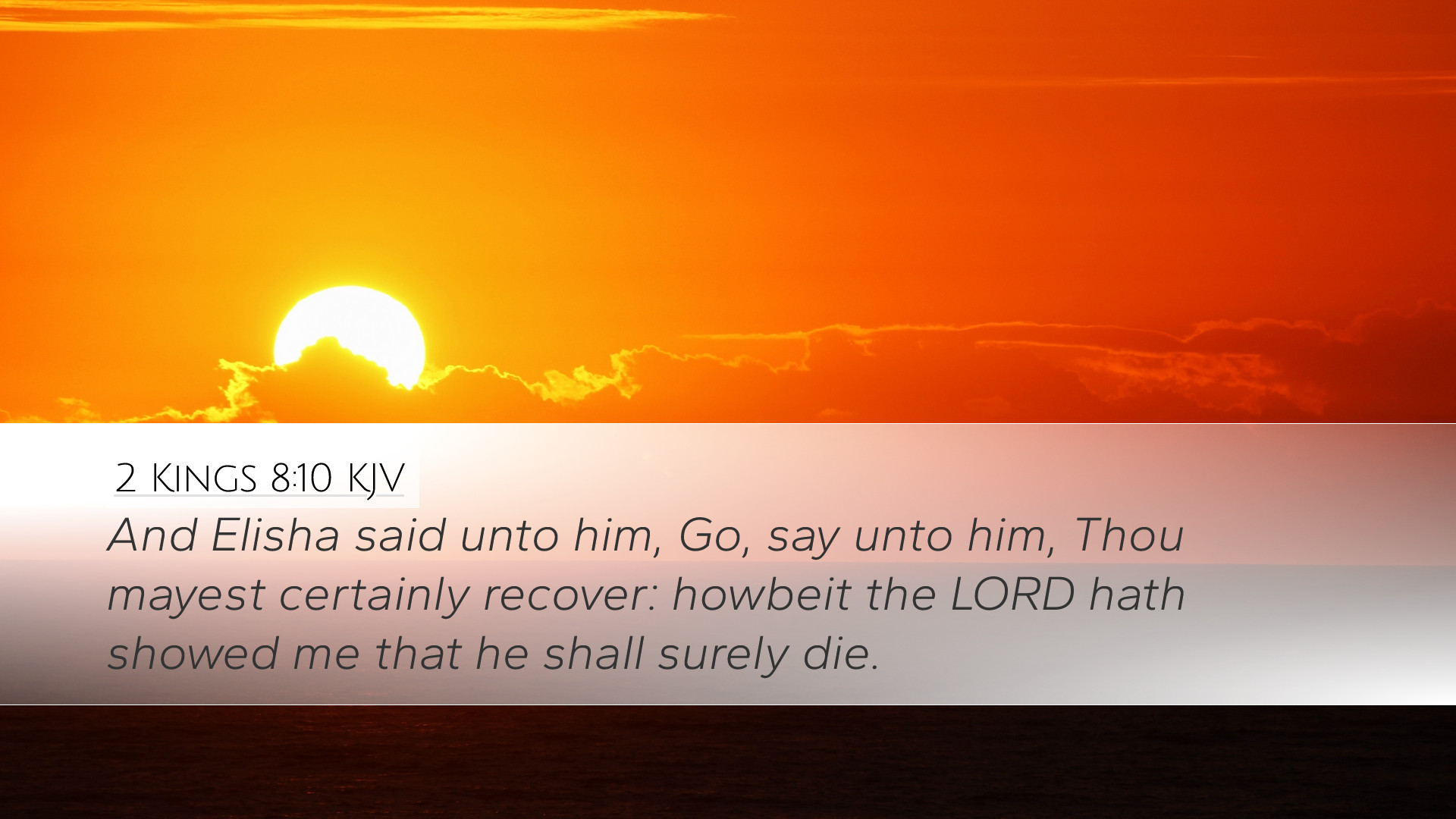Commentary on 2 Kings 8:10
Verse: "And Elisha said unto him, Go, say unto him, Thou mayest certainly recover: howbeit the LORD hath shewed me that he shall surely die."
This verse encapsulates a moment of profound prophetic insight and divine revelation, which showcases the duality of God’s will and the complexity of human understanding and experience. To grasp its meaning fully, we will delve into a combined commentary distilled from several esteemed public domain sources.
Contextual Background
The historical context of 2 Kings 8 lies within the narrative of the divided kingdom of Israel and Judah. Elisha, the prophet, continues the ministry of Elijah, delivering God’s messages and performing miracles. This chapter reveals the intrigue of royal courts and the unfolding of God’s plan through his prophetic voice.
Elisha's Role: As a prophet, Elisha serves as an intermediary between God and humanity, often bearing weighty messages concerning life, death, and the fate of nations. His engagements with kings and commoners alike demonstrate the breadth of his prophetic calling.
Analysis of the Verse
- The Assurance of Recovery: When Elisha communicates that the man could "certainly recover," it emphasizes the power of spoken words and the prophetic assurance that sometimes accompanies divine forecasts. This initial truth reflects God’s compassion and the hope for healing.
- The Ironic Twist: However, the shift in the latter part of the sentence, “howbeit the LORD hath shewed me that he shall surely die,” illustrates the tension between certain outcomes. This juxtaposition serves to remind us that earthly circumstances often don’t align with divine intentions.
- Divine Revelation: The phrase “the LORD hath shewed me” indicates the nature of prophetic insight, which is a revelation rather than a conjecture. Elisha’s awareness of the man’s fate comes directly from God, emphasizing the divine sovereignty over life and death.
Theological Insights
This scripture compels us to reflect on several theological themes:
- Providence: God's providential hand is at work even in tragic events. The knowledge of the man's future invites questions about the nature of suffering and God's omnipotence in human affairs.
- Human Agency: The interplay between God's foreknowledge and human free will is intricate here. Although the message from Elisha points to a divine decision, it also allows for the agency of the individual in seeking recovery.
- Hope amid Certainty: Elisha's initial declaration offers hope, reminding believers that even within the framework of God’s sovereign plan, there is room for prayer, healing, and intervention.
Practical Applications
This verse is not merely historical; it has contemporary relevance:
- Faith in Adversity: Pastors and congregants may draw comfort in knowing that even when diagnoses or troubling news surface about loved ones, God is sovereign and still in control.
- Prayer and Intercession: The emphasis on healing raises the importance of prayer in the Christian life. Believers are encouraged to intercede for those who are suffering, reflecting God's desire to involve us in His miraculous works.
- Understanding God’s Will: As students and scholars study this passage, the complexity of discerning God's will becomes paramount. Wisdom and discernment are essential in understanding the balance between hope and the acceptance of divine plans.
Conclusion
In summary, 2 Kings 8:10 presents a profound moment where prophetic insight reveals both a promise of recovery and the inevitability of death. This paradox serves as a vital teaching on God's sovereignty and human experience. For pastors, theologians, and lay readers alike, it encourages a deeper faith response, calls for intercessory prayer, and invites a contemplative approach to God's will in our lives. The nuances embedded within this commentary serve as a rich resource for anyone seeking to deepen their understanding of scripture and God's interaction with humanity.


